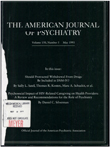Are depressive symptoms nonspecific in patients with acute stroke?
Abstract
OBJECTIVE: Some investigators have suggested that major depression might be overdiagnosed in stroke patients because of changes in appetite, sleep, or sexual interest caused by their medical illness; others have suggested that depression may be underdiagnosed in stroke patients who deny symptoms of depression because of anosognosia, neglect, or aprosody. The authors' goal was to determine how frequently depressive symptoms occur in acute stroke patients with and without depressed mood to estimate how often diagnostic errors of inclusion or exclusion may be made. METHOD: They examined the rate of autonomic and psychological symptoms of depression in 205 patients who were consecutively hospitalized for acute stroke. Eighty-five (41%) of these patients had depressed mood, and 120 (59%) had no mood disturbance. Forty-six (54%) of the 85 patients with depressed mood (22% of all patients) were assigned the DSM-III diagnosis of major depression. RESULTS: The 120 patients without mood disturbance had a mean of one autonomic symptom, but the 85 patients with depressed mood had a mean of almost four. Tightening the diagnostic criteria to account for one more nonspecific autonomic symptom decreased the number of patients with major depression by only three; adding two more criteria decreased the number by only five. Thus, the rate of DSM-III major depression was 1% higher than the rate with one extra nonspecific autonomic symptom and 2% higher than the rate with two extra criteria. Conversely, loosening diagnostic criteria to account for denial of depressive illness increased the rate of major depression by only 5%. CONCLUSIONS: Both autonomic and psychological depressive symptoms are strongly associated with depressed mood in acute stroke patients.
Access content
To read the fulltext, please use one of the options below to sign in or purchase access.- Personal login
- Institutional Login
- Sign in via OpenAthens
- Register for access
-
Please login/register if you wish to pair your device and check access availability.
Not a subscriber?
PsychiatryOnline subscription options offer access to the DSM-5 library, books, journals, CME, and patient resources. This all-in-one virtual library provides psychiatrists and mental health professionals with key resources for diagnosis, treatment, research, and professional development.
Need more help? PsychiatryOnline Customer Service may be reached by emailing [email protected] or by calling 800-368-5777 (in the U.S.) or 703-907-7322 (outside the U.S.).



